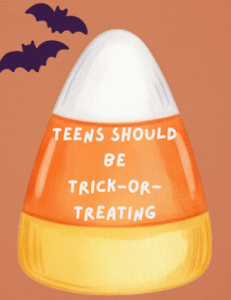A Teen’s Guide to Employment and Sports
Mar 11, 2021
At McIntosh we see many students that partake in jobs, sports, neither or both. The real question though is which is better? If someone was trying to decide between the two, which one should they decide on? On one hand, you have employment which can be a great way to gain valuable work experience, and on the other hand you have sports that give you the benefits of fitness and character building. Here we are going to explore both of these ideas and help you make the decision as to whether you should get a job, play a sport, do neither or do both.
EMPLOYMENT:
The decision on whether a teenager should come to a job can be a tough one. It goes way beyond just getting a job, but also deciding what type of job is best for you. For example, while working as a server can bring in a lot of tips, it also brings in a lot of stress. At the same time, you could choose an easier job, but it would come at the cost of not making as much money. Nevertheless, no matter what type of job you pick, the benefits of teen employment are universal.
Getting a job teaches you important life skills that you can take with you for the rest of your life.
Teen employment helps you learn to work with people. Getting a job is similar to joining a sport because your co-workers become, in some way, your teammates. The only difference is that while a person joins a sport to make friends, a person gets a job to make money, gain valuable experience and work hard. This means that it is not guaranteed you will like whoever you are working with. The sooner you learn how to work with difficult people, the better, because this is something that you will have to deal with for the rest of your life.
Furthermore, if you work in the customer service area, you will have to confront and talk to many different types of people. In doing this on a regular basis, you not only build your customer service ability , but also your ability to approach and talk to people. Building your customer service skills not only builds your confidence, but also your ability to solve problems on the fly.
The pros of getting a job as a teenager also go way beyond just valuable lessons and skills.
An obvious benefit of employment, is the employment itself! Having a job on your resume allows future employers to contact previous ones in order to prove that you are hardworking and dependable. In addition, while it is not guaranteed that you will like everyone you work with, having a job is still a great way to meet new people and make friends.
Getting a job as a teenager can also help you transition into adulthood. Knowing the day-to-day struggles of employment can produce an understanding of the adults around you that have jobs. Having this understanding helps you see what the real world past adolescence can look like once you leave high school or college.
Junior Jack Burke is a busser at Pascal’s Bistro and believes that employment is great at teaching teenagers responsibility and how to work in a more mature environment.
Burke says, “I guess it’s just responsibility. [It] teaches you how to actually function with adults in a work environment.
However, the biggest reason a person gets a job as a teenager is money.
“I’m trying to chase the bag, you know. I need money, because I got a car. My parents pay for it but I have to pay for the gas and all that, [and] you know, gas is expensive,” says Burke.
“I’m currently employed at Popeyes. I first wanted a job for gas money and to pay for food,” says junior Garett Keisling. “My favorite part about the job is the money by far.”
Having your own money is not just about having cash around to spend on little things. It is also about learning about the value of money and how fast it can run out. Once you learn that, you can start saving your money. And then once you have some money squirreled away in the bank it can enable you to do so many things with it. Depending on the job you have, you might even be able to help pay for college.
Having your own money can also give you a better sense of empowerment. The ability to buy stuff on your own can give you the new sense of freedom that comes from truly being able to own something.
Keisling says, “For others wanting a job, I would recommend going to the establishment in person decently dressed and politely ask if they are hiring. By making a good first impression, you are more likely to be considered for the job.”
SPORTS:
From a young age kids are encouraged to participate in sports because sports have benefits that can help individuals for the rest of their lives. Sports can create opportunities for athletes to get in shape and have fun. However, sports don’t just serve the purpose to make players sweaty and exhausted, they also help develop valuable character traits and build helpful life skills.
Athletics improve health, build character, teach life skills and can even help pay for college.
Whether it’s cross country or table tennis, every sport is active in some way. It’s obvious some sports are more physically demanding than others but no matter how little physical activity is involved, it is still beneficial. Even chess, a sport where you sit the whole time, exercises the brain by stimulating it to think.
If you are thinking about participating in a sport it might be important to take into consideration what type of health improvements you want to see. Different sports can have specific health benefits. For example, if someone had a goal to improve their cardiovascular endurance, a sport like track or soccer which involves a lot of running will be beneficial. Or maybe someone wants to improve their body image and burn some fat and gain more muscle. A sport like weightlifting would be best suited for that.
“I’ve played baseball since I was 4 because I have a genuine passion for the game and for sports… There’s nothing better than playing sports with your friends or building friendships through sports,” said junior Bray Taylor.
This exercise that sports encourages helps with not only physical health, but also to mental health. Physical activity releases chemicals in the brain which help improve mood and overall happiness.
“Physical activity also stimulates the release of dopamine, norepinephrine, and serotonin. These brain chemicals play an important part in regulating your mood… Raising your levels of serotonin boosts your mood and overall sense of well-being,” states Healthline.com in an article written about exercise and its effects on the brain.
Being involved in athletics is also a great way to build character. From the outside looking in sports may just seem like a group of people playing with a ball on a field or court, however, it is more meaningful than that. Sports hold little life lessons within the game that athletes learn from. They teach leadership like the responsibility of being a leader and how to lead by example. Athletes must also learn how to cooperate with other people and work as a team. These characteristics are all traits that prove useful in the real world.
Cooperation is also a very important trait to have when playing a team sport. “I’ve learned that you’ve got to work together to accomplish something. If one person messes up everybody messes up,” said Taylor.
Athletes can be very busy trying to balance practice, games, school, homework, and social life. Time management is just one example of many life lessons athletes learn when participating in sports.
“I set a regimen for myself on when I’ll get my work done and when I’ll focus on sports,” said Taylor.
Another is responsibility. If an athlete decides to play a sport there is a certain level of responsibility that the athlete must uphold. The athlete must be responsible and show up to practices and games, be accountable for things such as their uniform, and they must be responsible enough to be dedicated. Meaning they put in time and effort that will improve their game or the teams.
One last benefit of playing sports is the chance of getting a scholarship. If an athlete is good enough at their sport, colleges may offer them a scholarship making paying for college much easier. Additionally, because of how expensive college can be, an athletic scholarship can create more opportunities for students who may not be able to pay for college.
SPORTS VS EMPLOYMENT:
When one is weighing the pros and cons between sports and employment, there are many factors that need to be taken into consideration. It may not even be sports versus employment, it may be something else for you. For me, Zara Morgan, the decision was not sports versus employment, but rather my improv class versus employment. I took improv classes at the Legacy theatre from fifth grade all the way through the middle of my sophomore year of high school. The reason I ended up quitting was because the demands of school did not allow for me to be employed, babysit, and do improv. One of three had to go. In the end, I chose my employment over my hobby. Improv helped build my confidence, public speaking and problem solving skills. The reason that I ended up choosing employment was because I believed that employment not only provided the same benefits I received from Improv, but also so much more.
The decision to play sports or get a job is a big one but in my opinion why should you limit yourself? Both athletics and employment are important and have their own benefits, that is why I ,Landon Wilde, choose to play baseball and work. Yes, my schedule does get busy but I manage my time enough to do both. I have baseball practice and games throughout the week, therefore, the only time I can work is on the weekends. For me it was important to find a job with flexible hours so that I can reap the benefits of sports and a job. I would recommend finding a healthy balance between both sports and work.









